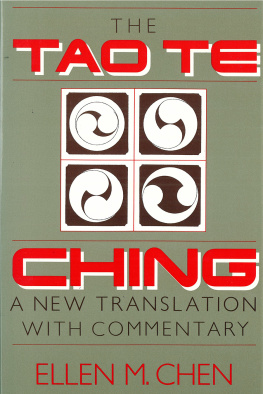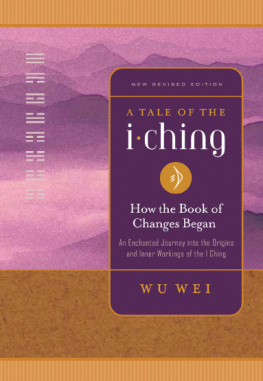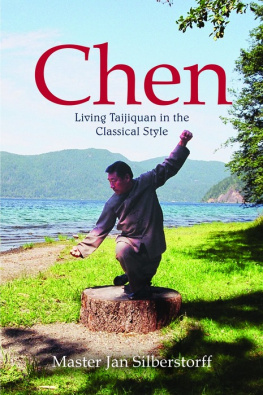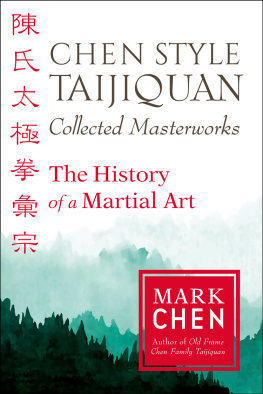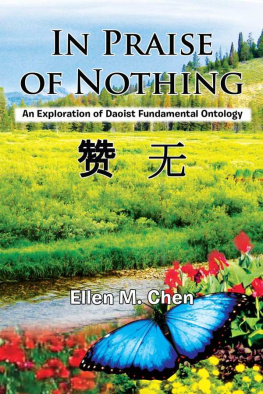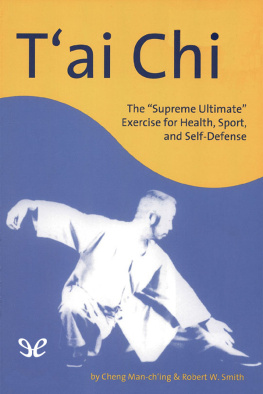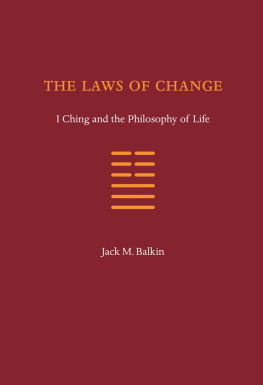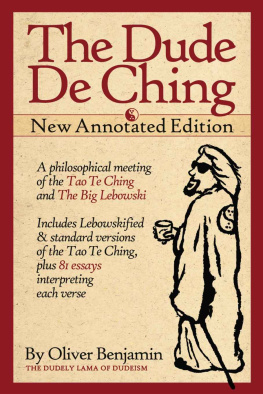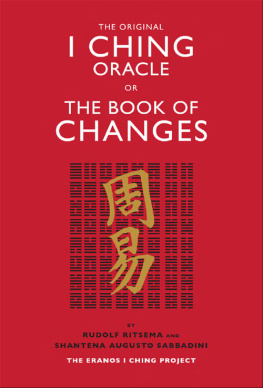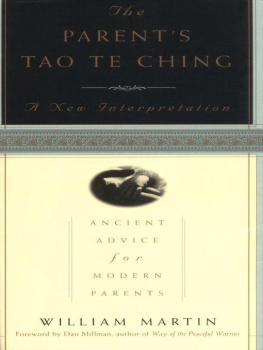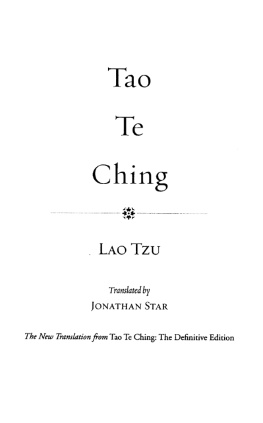Ellen Chen - Tao Te Ching
Here you can read online Ellen Chen - Tao Te Ching full text of the book (entire story) in english for free. Download pdf and epub, get meaning, cover and reviews about this ebook. year: 2012, publisher: Paragon House, genre: Religion. Description of the work, (preface) as well as reviews are available. Best literature library LitArk.com created for fans of good reading and offers a wide selection of genres:
Romance novel
Science fiction
Adventure
Detective
Science
History
Home and family
Prose
Art
Politics
Computer
Non-fiction
Religion
Business
Children
Humor
Choose a favorite category and find really read worthwhile books. Enjoy immersion in the world of imagination, feel the emotions of the characters or learn something new for yourself, make an fascinating discovery.
- Book:Tao Te Ching
- Author:
- Publisher:Paragon House
- Genre:
- Year:2012
- Rating:3 / 5
- Favourites:Add to favourites
- Your mark:
- 60
- 1
- 2
- 3
- 4
- 5
Tao Te Ching: summary, description and annotation
We offer to read an annotation, description, summary or preface (depends on what the author of the book "Tao Te Ching" wrote himself). If you haven't found the necessary information about the book — write in the comments, we will try to find it.
Tao Te Ching — read online for free the complete book (whole text) full work
Below is the text of the book, divided by pages. System saving the place of the last page read, allows you to conveniently read the book "Tao Te Ching" online for free, without having to search again every time where you left off. Put a bookmark, and you can go to the page where you finished reading at any time.
Font size:
Interval:
Bookmark:
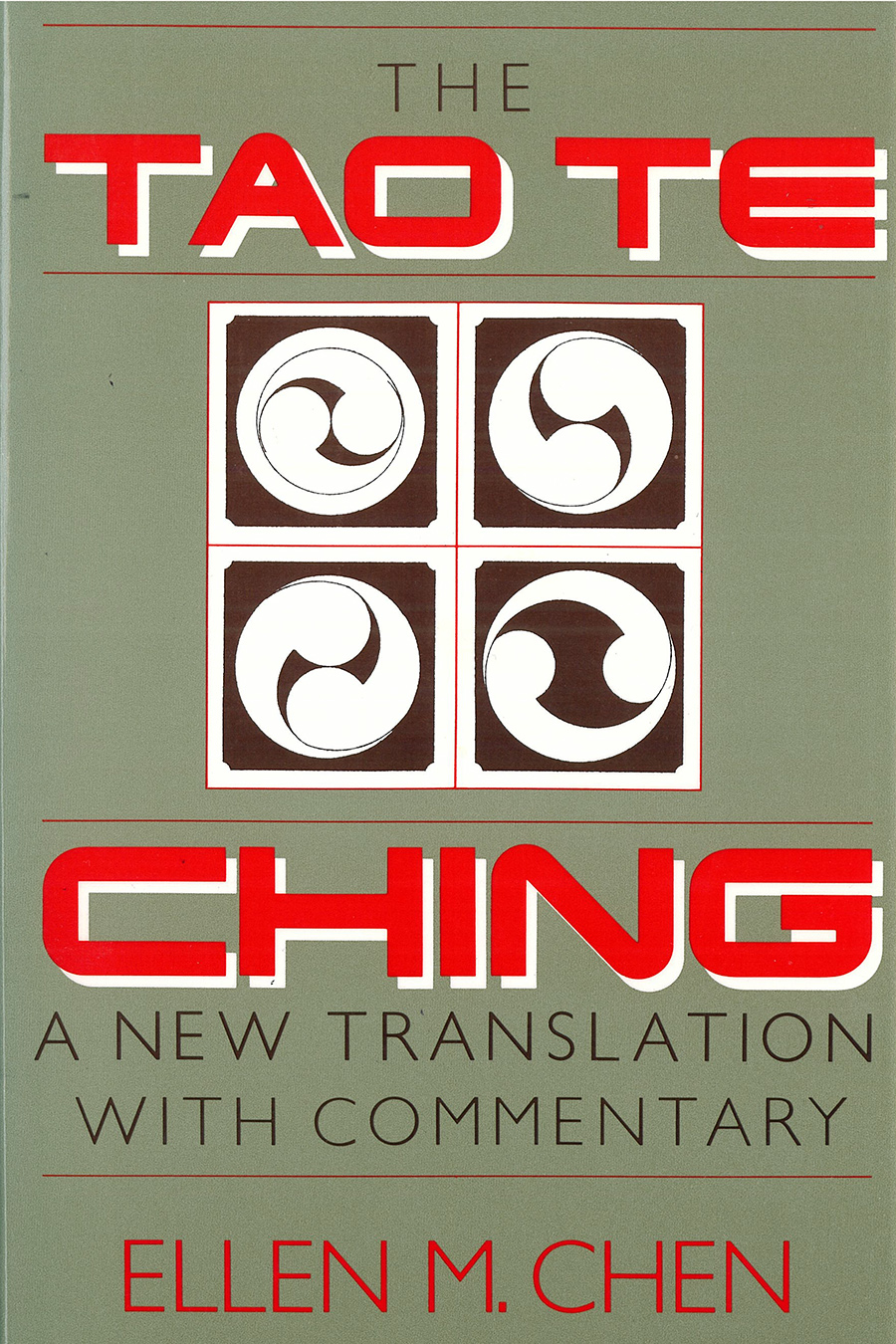
The Tao Te Ching
A New Translation with Commentary
ELLEN M. CHEN
A NEW ERA BOOK

PARAGON HOUSE
St. Paul, Minnesota
First edition, 1989
First e-book edition 2012
Published in the United States by
Paragon House
1925 Oakcrest Avenue
St. Paul, Minnesota 55113
www.ParagonHouse.com
Copyright 1989 by Paragon House
All rights reserved.
No part of this book may be reproduced, stored in a retrieval system, or
transmitted in any form or by any means, electronic, mechanical or
otherwise, without the prior written consent of the publishers, unless
by a reviewer who wishes to quote brief passages
A New Ecumenical Research Association Book
Manufactured in the United States of America
Library of Congress Catalog-in-Publication Data
Chen, Ellen M., 1933
The idea of peace in classical Taoism.
A New ERA Book
Bibliography: p.
Includes index.
1. Lao Tzu. Tao to ching. 2. Peace.
i. Title
BL 1900.L35C5432 1989 299.51482 88-22433
ISBN 1-55778-238-5 (pbk.)
ISBN: 978-1-61083-070-6 (e-book)
Contents
Preface
The Tao To Ching: An Introduction
Date and Authorship of the Tao Te Ching
The Tao Te Ching as a Religious Treatise
Use and Translation of the Text
The Tao To Ching: A New Translation and Commentary
Chapters 1-81
Bibliography
Chinese Glossary
Notes
To the memory of
My mother
Who bequeathed to me her accumulated te
Preface

In spite of the more than 400 commentaries (Yen Ling-fen, 1957) and more than forty translations into English, the Tao Te Ching is still a closed book to many of its readers. Some sinologists consider it to be a loose collection of seemingly unrelated statements. This is a tragedy. In not grasping its unifying theme, we are deprived of the benefits of a text that bears a particularly appropriate message for our time.
Long years of meditation on the Tao Te Ching have revealed to me its highly organic nature, each chapter being connected with others to form an organic whole. In order to lay the foundation for and serve as an introduction to works on Taoism in various stages of progresson fundamental ontology, cosmology, epistemology, ethics, politics, etc.I find it necessary first to determine the text itself, examining the philological studies as well as the major commentaries. I am convinced that the time has come for a new commentary on the Tao Te Ching that critically incorporates the best insights of important past commentaries, shows the internal consistency of the text and the organic connection of its various, chapters, and brings out many passages with deeper and more original meanings, as well as resolves some of the questions posed by its critics, past and present. Above all, my purpose in writing this commentary is to recover the archaic vision of the Tao Te Ching, a vision which was already blurred at the time of Confucius (551-479 b.c. ).
We are perhaps at the most opportune moment to succeed in this venture. The twentieth century has marked the discovery of the archaic mind. Findings in anthropology, archaeology, depth psychology, and history of religions, as well as the natural sciences have all collaborated to open a horizon of understanding hitherto inaccessible to our predecessors. Standing on the shoulders of giants in these fields, we now see much farther back into the past than Confucius or Plato. At the same time the spectacular findings in archaeological excavations in China in the last thirty or more years, particularly the discovery of the earliest texts of the Tao Te Ching in 1973-1974 at Ma-wang Tui of Changsha in Hunan province (Kao & Chih, 1974), have prompted a new assessment of the early development of Chinese civilization. Now one could see that the arrival of Confucianism was a relatively late event on the Chinese scene; thus, identifying Chinese culture with Confucianism represents a shortsighted view (Ping-ti Ho, 1975).
Equating Chinese civilization with Confucianism, which is viewed by many as devoid of deep religious content, entails the corollary that the Chinese are not very religious. Herbert A. Giles says: Confucianism is therefore entirely a system of morality, and not a religion (1969: 37). True, Chinese thought and religion are not centered, as are Christian metaphysics and religion, on the nature and worship of the Supreme Being as ens realissimum, a Being separate and transcending the physical world of change. Rather, Chinese religious practices revolve around the interrelationship and mutual affectivity of what Heidegger calls the fourfold neighborhood of earth, sky, divinities, and mortals (1977: 327). The absence of a focus on transcendence has been interpreted to mean that the Chinese do not search for or experience the divine. This is another example of Western absolutism at work. Just as there has been the need to destroy Western ontology (W. Marx: 85f), there is also the need to reevaluate the religions of transcendence.
In the years it has taken me to work out this commentary, the Tao Te Ching began to strike me more and more as fundamentally a religious text, though it has an altogether different message from those of the religions that supposedly arose in the same epoch. Most high religions worship a warrior-like supreme being. Tao, however, though prior to God (Ti, ch. 4.3) and giving birth to all beings, is a non-being (ch. 40.2). The Taoist is humble and meek, in imitation of Tao whose mode of operation is weakness (jo, ch. 40.1) and non-contention (pu-cheng, ch. 8.3). Tao is called a valley spirit (ch. 6.1) and is described as subject to the cycle of birth and death (ch. 25.2). Plainly Tao points to an agricultural deity, not a warrior god. While other religions exhort their believers to war against and transcend the earthly conditions, the Tao Te Ching regards the earth as the abode of Tao (ch. 25.3). Its central message is the peace of all in the bosom of Tao from which all beings issue and in which all conflicts and struggles dissolve (ch. 4.2). Its vision of peace is grounded in a vision of the ultimate reality as non-being whose passivity and self-abnegation allow all beings to be. The idea of peace (tai p ing), central to the text, then becomes the fitting title of this commentary. My aim in writing this commentary is not only to recover the vision of the Tao Te Ching, but also to show that this vision, born of a religious experience much earlier than that of the high religions, needs to be reinstated if humans are to find their proper place in the universe.
The second purpose of this commentary arises partly from anxiety about the worlds ecology, particularly in the face of possible nuclear conflict. While at times it seems that the momentum of the process has already accelerated beyond control, I am hopeful that the situation still can be reversed. No task today is more urgent than reducing the possibility of nuclear holocaust. We can no longer leave the work of peace in the hands of political leaders alone. These leaders, in order to progress toward peace, must be equipped with the profound religious and intellectual justification for peace. By bringing forth the Tao Te Chings vision of peace, I hope to help lay the foundation for a new religious-philosophical consciousness conducive to establishing peace on earth among all creatures.
This work had its earliest seed in my college thesis written at the National Taiwan University under the direction of the late Professor Beauson Tseng, who first awakened in me a love for philosophy. I cherish the memory of the many happy hours discussing philosophy in his house during my senior year, while he was busy preparing to assume the presidency of Tunghai University. At Fordham University, Professors Quentin Lauer and W. Norris Clarke taught me how to tread on solid ground of scholarship, the late Robert C. Pollock showed me how to make connections and soar into flights of insight, and Thomas Berry has given me inspiration and encouragement in all my endeavors. Frank Flinn of the New Ecumenical Research Association taught me to be concise. My husband Vincent has been patient, sympathetic, and long-suffering throughout these years of my labor. St. Johns University granted me a one-semester leave to prepare the manuscript for publication. The number of scholars and friends who have enlightened me in my intellectual journey far exceeds the few acknowledged in the body of the work and the bibliography. They are the real authors of what is valuable in the work. The inadequacies and errors that exist in this work, however, are wholly my responsibility.
Font size:
Interval:
Bookmark:
Similar books «Tao Te Ching»
Look at similar books to Tao Te Ching. We have selected literature similar in name and meaning in the hope of providing readers with more options to find new, interesting, not yet read works.
Discussion, reviews of the book Tao Te Ching and just readers' own opinions. Leave your comments, write what you think about the work, its meaning or the main characters. Specify what exactly you liked and what you didn't like, and why you think so.

